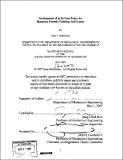Development of an in-line putter for handicap friendly tabletop golf games
Author(s)
Berberian, Sam J
DownloadFull printable version (3.571Mb)
Other Contributors
Massachusetts Institute of Technology. Dept. of Mechanical Engineering.
Advisor
Sang-Gook Kim.
Terms of use
Metadata
Show full item recordAbstract
The market for handicapped tabletop games is severely untapped. The students of the Red Team in the course 2.009 (Product Engineering Processes, a capstone design project course in the Mechanical Engineering Department) at the Massachusetts Institute of Technology attempted to produce a tabletop golf game that would even the playing field between handicapped and able-bodied individuals. This game, Microgolf, was not received well by the faculty. One of the largest downfalls of Microgolf was an inherent lack of control over the putting aspect of the game. The putter designed by the 2.009 Red Team was difficult to use as it shot the ball perpendicular to the line of sight path between the ball and the hole used by the user to aim. The goal of this thesis is to design a user friendly putter that would provide a substantial amount of control over the shooting aspects of the game, thus truly leveling the playing field between handicapped and able-bodied individuals, and providing a more exciting playing environment. After several rounds of modeling and optimization, a final design is accomplished that accommodates all of the functional requirements desired by players. (cont.) This putter is lightweight and could be used with one hand, aided by a set of legs near the front end that allowed it to rest on the table for support. The putter relies on user input for aim, and the ball could be shot in situ after aiming, without having to shift position. A four bar linkage system and trigger are used to actuate a putter shaft and head such that the output response is a function of the input force controlled by the finger movement. This shooting action is repeatable, thus allowing for easy, continuous play while requiring players' delicate control of orientation and force. The putter itself is visually appealing, and costs less than $5 to make. This putter is well received by a group of handicapped individuals who are asked to test it out and provide feedback. This new design would greatly enhance a tabletop golf game by providing a lot of control over the shooting aspects of the game.
Description
Thesis (S.B.)--Massachusetts Institute of Technology, Dept. of Mechanical Engineering, 2007. Includes bibliographical references (leaf 57).
Date issued
2007Department
Massachusetts Institute of Technology. Department of Mechanical EngineeringPublisher
Massachusetts Institute of Technology
Keywords
Mechanical Engineering.